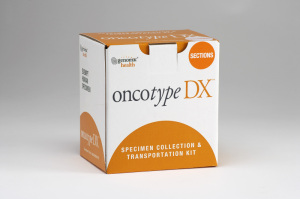by
Lauren Dubinsky, Senior Reporter | September 15, 2016
A genomic test that’s commonly used to help physicians determine if women with ductal carcinoma in situ (DCIS) breast cancer should undergo radiation is not cost-effective, according to a new study conducted by UCLA and Harvard University, along with the University of Texas Southwestern Medical Center.
“Choosing treatment strategy requires value judgments,” Dr. Ann C. Raldow, assistant professor in residence in the department of radiation oncology at UCLA, told HCB News. “While radiation carries a chance of side effects that may reduce the quality of a patient's life, observation carries the chance of an increased risk of recurrence.”
Medicare currently reimburses about $3,400 for Genomic Health's Oncotype Dx DCIS test. The researchers tested it by using a standard willingness-to-pay threshold of $100,000 for each quality-adjusted life year and found that it’s not cost-effective.



Ad Statistics
Times Displayed: 2157
Times Visited: 29 Keep biomedical devices ready to go, so care teams can be ready to care for patients. GE HealthCare’s ReadySee™ helps overcome frustrations due to lack of network and device visibility, manual troubleshooting, and downtime.
But that doesn't mean Oncotype Dx DCIS doesn't have significant value. According to the researchers, by reducing the number of patients undergoing radiation, the test could also reduce the number of women experiencing the side effects and cost impact of treatment.
Is the price tag justified in terms of reducing radiation therapy? The researchers think that’s still a subject of debate.
Women who have breast-conserving surgery for DCIS without radiation therapy have about a 25 to 30 percent chance of recurrence at some point in the future according to breastcancer.org. However, incorporating radiation therapy into the treatment plan after surgery reduces the risk of recurrence to about 15 percent.
Previous studies have shown that the Oncotype Dx test is able to predict the 10-year risk of local recurrence of an invasive carcinoma in patients with DCIS who were treated with breast-conserving surgery without radiation. However, these new findings can provide physicians with the cost/benefit of incorporating the test into their practice.
“The preference for whether or not to undergo radiation treatment will depend on how a patient values the benefits and harms associated with each scenario,” said Raldow. “Therefore, physicians should discuss trade-offs associated with omitting or adding adjuvant radiation therapy with each patient to maximize quality-of-life findings.”

